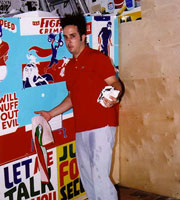Reposted from my commentary on a thread on Artworld Salon entitled "Arts of Torture?"
Are we witnessing the birth of waterboard chic? Can it be marketed as an XXX-treme sport, with designer face masks, bindings and boards? Might there be a dress code, with teams and uniforms? What would the suspected terrorist wear? or the sartorially correct interrogator? Relevant to this, a T-shirt for sale on a "humorous" conservative website has recently engendered intensely partisan commentary on The Atlantic blog. Humor, not surprisingly, retains a red state/blue state dichotomy.

While Steve Powers probably resides somewhere on the (libertarian) left, he also wants to foment cascades of outrage. Creative Time, presenter of The Waterboarding Thrill Ride, would like to spin it as fostering a "dialogue about the implications of waterboarding". But Jonathan's question is a good one: does the piece merely trivialize this debate, piggybacking on a hot button topic for a free joy ride, for an expected jolt of controversy? Or will public consciousness somehow be engaged and elevated? It's the old yardstick applied to obscenity cases: that of redeeming social significance. Titillation without redemption is a no-no.

Art does not have to be polite. It can be outrageous and irreverent. And as this comes with the Deitch imprimatur, its surrender to naughty spectacle at all times is essentially a given. I generally appreciate Steve Powers' work, his post graffiti swagger. He is a prime practitioner of confrontational, wryly subversive agitprop. Subtlety is never his strong suit. And certainly the venue itself, an amusement park, encourages broad strokes. To place a waterboarding "ride" amidst Coney Island's usual attractions merges the vernacular of street signage and performance, of side shows by the sea, with a "message". But can this message rise above the banal? Yes, waterboarding is decidedly "bad". Yes, media images of torture are inevitably flattened, robbed of moral imperative, becoming grist for the infotainment mill. But isn't this something we already know? Been there, done that, what else can you tell me.
I also question the private waterboarding session. Catherine interestingly cites its group aspect (with lawyers! are they planning to litigate afterwards?) as suggestive of certain denominational rites, like baptism. She also references other performance artists who have engaged in mortifications of the flesh. But Bob Flanagan, Ron Athey, Stelarc and Chris Burden appeal to something personal, an internal dialogue with the limits of their bodies, with the transcendence of pain and the transformation of the spirit in extremis. Somehow I don't get the same charge of mind/body/spirit from Steve Powers' prospective performance. Appended to his carny sideshow attraction (which admittedly I have not yet seen), it feels more like Jackass than a Robert Bresson film. All prank, no transcendence.

Recreational Waterboarding
It seems Warhol's famous dictum, that in the future everyone will be famous for 15 minutes, has devolved into "everyone can be waterboarded for five seconds" -- particularly if you're an attorney-at-law. New York Magazine reports that Steve Powers is assembling his own coalition of the willing, 50 lawyers who will submit to a private waterboarding session. The potential logistics are risible. One waterboard and a queue of counselors impatiently checking their watches (remember, these guys generally bill by the hour). Or perhaps a group dousing, with multiple boards. Interested attorneys can email ridethewaterboard@gmail.com.
Is Mr. Powers inspired by a previous instance of recreational waterboarding, organized by a public access talk show outside a Tampa strip club? Their tagline: "Decide for yourself what waterboarding is all about!!!”